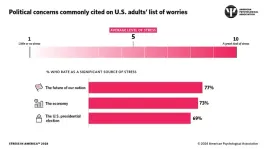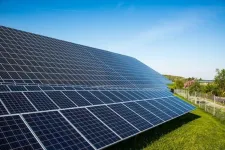(Press-News.org) WASHINGTON — More than 7 in 10 adults said the future of the nation (77%) is a significant source of stress in their lives, with the economy (73%) and the 2024 U.S. presidential election (69%) following closely behind, according to the latest Stress in America™ survey released today by the American Psychological Association.
At the same time, the poll found many common stressors among people with different political party affiliations. The survey was conducted by The Harris Poll on behalf of APA among more than 3,000 U.S. adults age 18+ between Aug. 1 and 23, 2024.
Compared with the previous two U.S. presidential elections, stress related to the election was similar to 2020 (69% vs. 68%) but significantly higher than in 2016 (52%). What sets the 2024 poll apart from previous APA election surveys is the collective stress about the potential fallout from the election results: More than 7 in 10 adults (72%) said they are worried the election results could lead to violence, and more than half of adults (56%) said they believed the 2024 presidential election could be the end of democracy in the U.S. Meanwhile, around a third of adults (32%) said the political climate has caused strain among themselves and their family members, with (30%) who said they limit their time with family because they don’t share the same values.
“For nearly a decade, people have faced a political climate that is highly charged, which has led to the erosion of civil discourse and strained our relationships with our friends and our families. But isolating ourselves from our communities is a recipe for adding more stress to our lives,” said APA CEO Arthur C. Evans Jr., PhD. “We must remember that the most extreme voices are often the loudest, and that the majority of adults share similar values and concerns.”
Stress in America™ 2024: A Nation in Political Turmoil reveals a country where trust has been shaken in the government and in each other. Most adults (54%) reported they have very little to no trust in the U.S. government, and 41% of adults reported the state of the nation has made them consider moving to a different country. Half of adults (50%) said tension around social and political topics makes them less likely to want to connect with other people and around 3 in 10 (28%) said they have nothing in common with people who have different political opinions than they do. More than 2 in 5 adults (46%) wouldn’t date someone who didn’t share the same political opinions (47% of women said this, and 45% of men).
Yet the survey showed commonalities regardless of political party affiliation, with the future of the nation being the stressor that was most commonly rated as significant by Republicans (80%), Democrats (79%) and independents (73%). Further, Republicans, Democrats and independents agreed that the country’s system of checks and balances isn’t working (76% of Republicans, 71% of Democrats and 74% of independents). They also reported being stressed that politicians aren’t talking about the things that are most important to them (62%, 58% and 60%, respectively), and that the political climate has caused strain between them and their family members (32%, 35% and 32%, respectively).
Mis- and disinformation have dialed up the volume on stress, as many adults (73%) reported it is stressful to know how real fake information can look or seem. A strong majority (82%) of U.S. adults were worried that people may be basing their values and opinions on false or inaccurate information.
Despite the pervasive stress about the nation’s future and the fear of violence, this year’s survey showcased how participants are using the political climate as a springboard for activism and driving positive change. More than three-quarters of adults (77%) said they intend to vote in the presidential election, and half of adults (51%) said they feel more compelled to volunteer or support causes they value — significantly higher than the 45% who said so in 2019 during the lead up to the 2020 presidential election. Diverse communities in particular are being moved to act; 73% of Black adults and 67% of Latino/a/e adults reported feeling that their vote matters.
In addition, 3 in 5 adults reported feeling hopeful about the change this election will bring (61%), and that this election will lead to a more inclusive society (59%). More than 2 in 5 adults (42%) said they haven’t felt this excited about an election in years. Significantly, although Black and Latino/a/e groups and those who identify as LGBTQ reported personal safety as a major stressor (47%, 47% and 50%, respectively), they have remained optimistic; 64% of Black and Latino/a/e adults reported feeling hopeful that the election could mean a more inclusive future.
“Stress surrounding the upcoming election seems overwhelming. But despite concerns about a nation divided across cultural identities and political parties, it’s encouraging that hope could be the catalyst, where people can come together and have a stake in deciding their future,” said Evans. “We see people’s desire for positive change as an opportunity to channel our collective stress into meaningful conversations and actions that promote healing and understanding.”
For more information on the survey findings and helpful resources on how to handle stress, go to www.stressinamerica.org.
METHODOLOGY
The 2024 Stress in America™ survey was conducted online within the United States by The Harris Poll on behalf of the American Psychological Association between Aug. 1–23, 2024, among 3,305 adults ages 18+ who reside in the U.S. that serves as a nationally representative sample. In addition to the national sample, oversamples were collected to allow for subgroup analysis within race/ethnicity groups. Sample sizes across the national and oversamples are as follows: 801 Black, 855 Hispanic and 804 Asian. Interviews were conducted in English and Spanish. Throughout the report, mentions of political parties are defined by those who self-identify as registered voters of the Democratic, Republican, or independent party. A full methodology is available.
The American Psychological Association, in Washington, D.C., is the largest scientific and professional organization representing psychology in the United States. APA’s membership includes over 157,000 researchers, educators, clinicians, consultants and students. Through its divisions in 54 subfields of psychology and affiliations with 60 state, territorial and Canadian provincial associations, APA works to advance the creation, communication and application of psychological knowledge to benefit society and improve people’s lives.
END
APA Poll: Future of nation, economy and presidential election top U.S. stressors
Most U.S. adults concerned about political violence, end of democracy
2024-10-22
ELSE PRESS RELEASES FROM THIS DATE:
Towards better solar cells: Exploring an anomalous phenomenon of electricity generation
2024-10-22
The bulk photovoltaic (BPV) effect is an uncommon phenomenon that may enable certain materials to outperform the conventional p–n junctions used in solar cells. In a recent study, researchers from Japan have experimentally demonstrated the BPV effect in alpha-phase indium selenide (α-In2Se3) for the first time along the out-of-plane direction, validating previous theoretical predictions. The remarkable conversion efficiency recorded in their α-In2Se3 device signals a promising advancement for future solar cell technologies and photosensors.
A firm understanding ...
KERI’s innovation in anode materials for solid-state batteries selected as a cover article
2024-10-22
The KERI's research on anode materials for solid-state batteries (SSBs), conducted in collaboration with Kumoh National Institute of Technology and Inha University, has been selected as the cover article of a world-leading journal in the energy field.
The SSBs have replaced the combustible liquid electrolyte that transfers ions between the anode and cathode with a solid electrolyte, significantly reducing the risk of fire or explosion. However, SSBs, due to their 'solid' nature, require much advanced technology, such as ensuring electro-chemo-mechanical stability during the charging and discharging processes. In particular, since the anode has a ...
A visit from the stork brings genomic hope for this endangered species
2024-10-22
A Visit from the Stork Brings Genomic Hope for this Endangered Species
A new genomic study of the endangered Oriental Stork reveals that the population's genetic health is still surprisingly strong, with high genetic diversity and low levels of inbreeding. This is an uncommon finding in most endangered species populations, which makes it more difficult to rescue those species from extinction. Thus, despite the human-caused decline in the Oriental stork numbers, the findings in this study provide hope for the species' long-term ...
Study uncovers the true burden of asthma in African pupils, highlighting need for better access to asthma diagnosis and care
2024-10-21
Peer reviewed | Observational study | People
Rapid urbanisation and population growth in sub-Saharan Africa has increased the incidence of asthma in young people, but the lack of diagnosis and care means that many young people are suffering from untreated symptoms of asthma, according to research from Queen Mary University of London.
The team who led the study, whose pioneering research on the impact of pollution on lung health was instrumental in introducing the Ultra Low-Emission Zone (ULEZ) in London, are calling for better access to asthma diagnosis and care in areas of ...
A remote-controlled car for cancer immunotherapy
2024-10-21
OCTOBER 21, 2024, NEW YORK – Ludwig Cancer Research scientists have devised new types of chimeric antigen-receptor (CAR) T cells—a type of cancer immunotherapy—that can be switched on to varying degrees of intensity and then switched off on demand with existing drugs. The design and preclinical evaluation of the CAR-T cells, led by Melita Irving and Greta Maria Paola Giordano Attianese of the Lausanne Branch of the Ludwig Institute for Cancer Research, is detailed in this week’s issue of the Proceedings of the National Academy of Sciences.
“CAR-T cells are already used today to treat a number of blood cancers, but ...
New ice core data provides insight into climate ‘tipping points’ during the last Ice Age
2024-10-21
CORVALLIS, Ore. – A changing climate triggers a sudden shift in ocean circulation, creating weather havoc and plunging Earth into an abrupt new Ice Age.
It sounds like the basis for a Hollywood blockbuster - the 2004 science fiction disaster film “The Day After Tomorrow,” has similar plot lines – but it’s actually a scenario that played out multiple times during the last Ice Age, which ended more than 11,000 years ago.
Just published research from multiple ice cores collected across Greenland with data spanning up to 120,000 years provides new understanding of these abrupt events, how they unfold and what that might ...
Being part of a ‘civilization’ only reduces violence if you’re a woman in ancient Andes populations
2024-10-21
The extent to which “civilization” heightens or lessens the likelihood of violent conflict throughout human history has remained one of the most enduring questions among anthropologists. But a new collaborative study of archaeological groups from the Andes region of South America suggests that being part of a centrally organized state society is only part of the equation.
“Our findings suggest that being in a ‘civilization’ may reduce violence, but only for women, and only slightly then,” ...
Gladstone to present 2024 Ogawa-Yamanaka Stem Cell Prize to Neuroscientist Rusty Gage
2024-10-21
SAN FRANCISCO—Neuroscientist Rusty Gage, PhD, will be the recipient of the 2024 Ogawa-Yamanaka Stem Cell Prize, awarded by Gladstone Institutes. He was selected for pioneering stem cell biology of the central nervous system and the use of reprogrammed cells to study age-related neurodegenerative disease and psychiatric disorders.
Gage is a professor in the Laboratory of Genetics at the Salk Institute for Biological Studies, where he also serves as the Vi and John Adler Chair for Research on Age-Related Neurodegenerative Disease. He was president of the Salk Institute from 2018 to 2023.
Over the course of his scientific career, Gage has made several paradigm-shifting ...
A blueprint for mapping melting ice sheets
2024-10-21
Researchers in the Stanford Radio Glaciology lab use radio waves to understand rapidly changing ice sheets and their contributions to global sea-level rise. This technique has revealed groundwater beneath Greenland, the long-term impacts of extreme melt, a process that could accelerate ice sheet mass loss in Antarctica, the potential instability of an ice sheet that could raise sea levels by 10 feet, and more.
Now, PhD students within the group have created an open-source tool that others can use to make ice-penetrating radar systems, core instruments ...
People hate stories they think were written by AI. Even if they were written by people
2024-10-21
Stories written by the latest version of ChatGPT were nearly as good as those written by human authors, according to new research on the narrative skills of artificial intelligence.
But when people were told a story was written by AI — whether the true author was an algorithm or a person — they rated the story poorly, a sign that people distrust and dislike AI-generated art.
“People don’t like when they think a story is written by AI, whether it was or not,” said Haoran “Chris” Chu, Ph.D., a professor of public relations at the University of Florida and co-author of the new study. “AI is good at writing something that is consistent, ...
LAST 30 PRESS RELEASES:
Researchers develop new strategy for improving inverted perovskite solar cells
Yes! The role of YAP and CTGF as potential therapeutic targets for preventing severe liver disease
Pancreatic cancer may begin hiding from the immune system earlier than we thought
Robotic wing inspired by nature delivers leap in underwater stability
A clinical reveals that aniridia causes a progressive loss of corneal sensitivity
Fossil amber reveals the secret lives of Cretaceous ants
Predicting extreme rainfall through novel spatial modeling
The Lancet: First-ever in-utero stem cell therapy for fetal spina bifida repair is safe, study finds
Nanoplastics can interact with Salmonella to affect food safety, study shows
Eric Moore, M.D., elected to Mayo Clinic Board of Trustees
NYU named “research powerhouse” in new analysis
New polymer materials may offer breakthrough solution for hard-to-remove PFAS in water
Biochar can either curb or boost greenhouse gas emissions depending on soil conditions, new study finds
Nanobiochar emerges as a next generation solution for cleaner water, healthier soils, and resilient ecosystems
Study finds more parents saying ‘No’ to vitamin K, putting babies’ brains at risk
Scientists develop new gut health measure that tracks disease
Rice gene discovery could cut fertiliser use while protecting yields
Jumping ‘DNA parasites’ linked to early stages of tumour formation
Ultra-sensitive CAR T cells provide potential strategy to treat solid tumors
Early Neanderthal-Human interbreeding was strongly sex biased
North American bird declines are widespread and accelerating in agricultural hotspots
Researchers recommend strategies for improved genetic privacy legislation
How birds achieve sweet success
More sensitive cell therapy may be a HIT against solid cancers
Scientists map how aging reshapes cells across the entire mammalian body
Hotspots of accelerated bird decline linked to agricultural activity
How ancient attraction shaped the human genome
NJIT faculty named Senior Members of the National Academy of Inventors
App aids substance use recovery in vulnerable populations
College students nationwide received lifesaving education on sudden cardiac death
[Press-News.org] APA Poll: Future of nation, economy and presidential election top U.S. stressorsMost U.S. adults concerned about political violence, end of democracy








